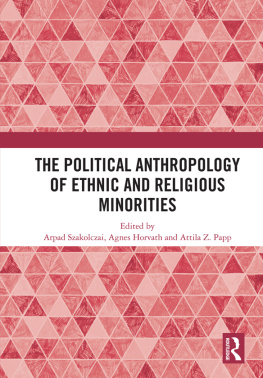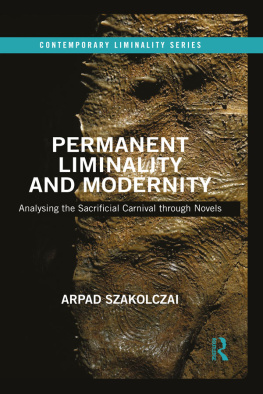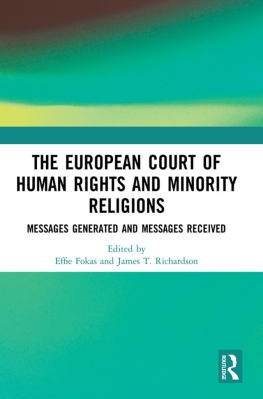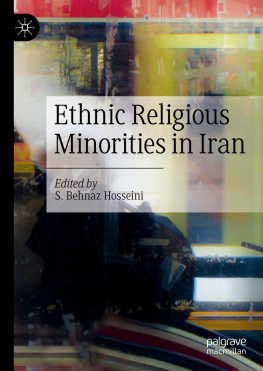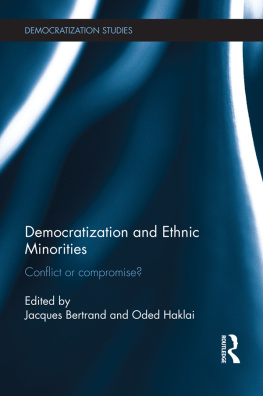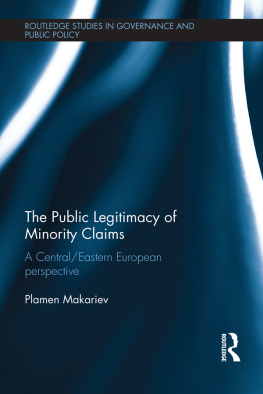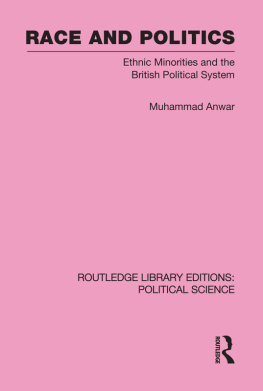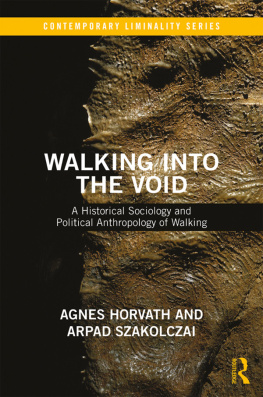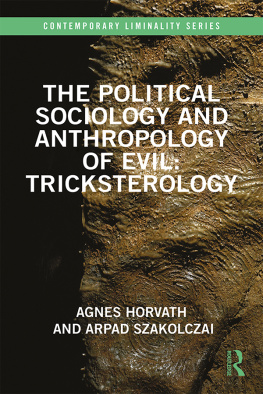The Political Anthropology of Ethnic and Religious Minorities
This book presents some arguments for why a political anthropological perspective can be particularly helpful for understanding the connected political and cultural challenges and opportunities posed by the situation of ethnic and religious minorities. The first chapter shortly introduces the major anthropological concepts used, including liminality, trickster, imitation, and schismogenesis; concepts that are used together with approaches of historical sociology and genealogy, especially concerning the rise and fall of empires, and their lasting impact. The conceptual framework suggested here is particularly helpful for understanding how marginal places can become liminal, appearing suddenly at the center of political attention. The introduction also shows the manner in which minority existence can problematize the depersonalizing tendencies of modern globalization. Subsequent chapters demonstrate how the political anthropological conceptual framework presented can be used for various European regions, through the cases of certain ethnic and religious minorities, and each illustrates that instead of charismatic leaders, trickster politicians are emerging and increasingly dominate, through the public sphere, the space of modern politics emptied of real presence.
The chapters in this book were originally published as a special issue of Nationalism and Ethnic Politics.
Arpad Szakolczai is Professor of Sociology at University College Cork, Ireland, and has previously taught at the European University Institute, Florence, Italy. His recent books include Comedy and the Public Sphere: The Rebirth of Theatre as Comedy and the Genealogy of the Modern Public Arena (2013), Novels and the Sociology of the Contemporary (2016), and Permanent Liminality and Modernity: Analysing the Sacrificial Carnival through Novels (2017).
Agnes Horvath is a sociologist and political scientist with an interest in an anthropological understanding of modernity. She has taught in Hungary, Italy, and Ireland. Her publications include Walking into the Void: A Historical Sociology and Political Anthropology of Walking (2018), Modernism and Charisma (2013), and Breaking Boundaries: Varieties of Liminality (2015).
Attila Z. Papp is a sociologist, and he is director of the Institute for Minority Studies at the Hungarian Academy of Sciences, Centre for Social Sciences, Budapest, Hungary. His articles include 21st Century Hungarian Language Survival in Transylvania (2015) and Minority Hungarian Communities in the Twentieth Century (2010).
The Political Anthropology of Ethnic and Religious Minorities
Edited by
Arpad Szakolczai, Agnes Horvath and Attila Z. Papp
First published 2018
by Routledge
2 Park Square, Milton Park, Abingdon, Oxon, OX14 4RN, UK
and by Routledge
711 Third Avenue, New York, NY 10017, USA
Routledge is an imprint of the Taylor & Francis Group, an informa business
2018 Taylor & Francis
All rights reserved. No part of this book may be reprinted or reproduced or utilised in any form or by any electronic, mechanical, or other means, now known or hereafter invented, including photocopying and recording, or in any information storage or retrieval system, without permission in writing from the publishers.
Trademark notice: Product or corporate names may be trademarks or registered trademarks, and are used only for identification and explanation without intent to infringe.
British Library Cataloguing in Publication Data
A catalogue record for this book is available from the British Library
ISBN 13: 978-0-8153-8212-6
Typeset in Garamond
by diacriTech, Chennai
Publishers Note
The publisher accepts responsibility for any inconsistencies that may have arisen during the conversion of this book from journal articles to book chapters, namely the possible inclusion of journal terminology.
Disclaimer
Every effort has been made to contact copyright holders for their permission to reprint material in this book. The publishers would be grateful to hear from any copyright holder who is not here acknowledged and will undertake to rectify any errors or omissions in future editions of this book.
Contents
Arpad Szakolczai, Agnes Horvath, and Attila Z. Papp
Attila Z. Papp
James Kapal
Marius Ion Bena
Arvydas Griinas
Jesenko Tean
Duncan Morrow
Vassos Argyrou
The chapters in this book were originally published in Nationalism and Ethnic Politics, volume 23, issue 1 (2017). When citing this material, please use the original page numbering for each article, as follows:
Arpad Szakolczai, Agnes Horvath, and Attila Z. Papp
Nationalism and Ethnic Politics, volume 23, issue 1 (2017) pp. 117
Attila Z. Papp
Nationalism and Ethnic Politics, volume 23, issue 1 (2017) pp. 1832
James Kapal
Nationalism and Ethnic Politics, volume 23, issue 1 (2017) pp. 3351
Marius Ion Bena
Nationalism and Ethnic Politics, volume 23, issue 1 (2017) pp. 5265
Arvydas Griinas
Nationalism and Ethnic Politics, volume 23, issue 1 (2017) pp. 6680
Jesenko Tean
Nationalism and Ethnic Politics, volume 23, issue 1 (2017) pp. 8197
Duncan Morrow
Nationalism and Ethnic Politics, volume 23, issue 1 (2017) pp. 98117
Vassos Argyrou
Nationalism and Ethnic Politics, volume 23, issue 1 (2017) pp. 118132
For any permission-related enquiries please visit:
http://www.tandfonline.com/page/help/permissions
Vassos Argyrou is professor of Social Anthropology and Cultural Theory at the University of Hull, UK. His latest book is The Gift of European Thought and the Cost of Living (Berghahn, 2013).
Marius Ion Bena is Guest Lecturer in the Department of Journalism at the Babe-Bolyai University, Cluj-Napoca, Romania, and a journalist. His main research interests are phenomenological sociology, social theory, identity, media, and technology. His book Experiencing Multiple Realities is forthcoming with Routledge, 2018.
Arvydas Griinas is a Lecturer at the Vilnius Academy of Arts, Lithuania. His research interests include political anthropology, experiential history, and identity formation (particularly in Central-Eastern Europe). His book Politics with a Human Face is forthcoming with Routledge, 2018.
Agnes Horvath is a sociologist and political scientist with an interest in an anthropological understanding of modernity. She has taught in Hungary, Italy, and Ireland. Her publications include Walking into the Void: A Historical Sociology and Political Anthropology of Walking (2018), Modernism and Charisma (2013), and Breaking Boundaries: Varieties of Liminality (2015).
James Kapal is Senior Lecturer in the Study of Religions at University College Cork, Ireland. His research interests are minority religions in Eastern and Central Europe, folk and material religion, and religions in the secret police archives in postcommunist states. He is Principal Investigator of the European Research Council funded project

